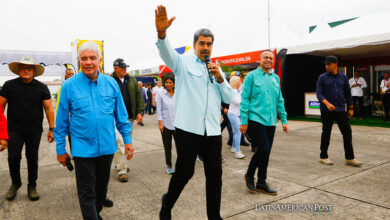Peru’s referendum: What changes will there be if it is approved?
This December 9 will vote on the referendum to amend articles of the Constitution and thus curb the wave of corruption that affects the country

The president of Peru, Martín Vizcarra, seeks to approve a referendum in his country at the beginning of December. With this strategy, Vizcarra hopes to modify certain articles of the Constitution in order to reform the National Council of the Magistracy (CNM), avoid the immediate re-election of congressmen, allow private financing of political parties and electoral campaigns and move towards a bicameral Congress .
Leer en español: ¿Qué cambios habrá en Perú de aprobarse el referendo impulsado por el Ejecutivo?
There was doubt about the date on which Peruvians would participate in the referendum, but on September 25, when President Vizcarra participated in the General Assembly of the United Nations Organization, he confirmed that the referendum will be held on December 9. this year.
This December 9th, Peruvians will vote on the referendum to amend articles of the Constitution and thus reduce the wave of corruption that affects the country
The president of Peru, Martín Vizcarra, seeks to approve a referendum in his country at the beginning of December. With this strategy, Vizcarra hopes to modify certain articles of the Constitution in order to reform the National Council of the Magistracy (CNM), avoid the immediate re-election of congressmen, allow private financing of political parties and electoral campaigns, and establish a bicameral Congress.
There was doubt about the date on which Peruvians would participate in the referendum, but on September 25, when President Vizcarra participated in the General Assembly of the United Nations, he confirmed that the referendum will be held on December 9, this year.
"Less than two months ago, we presented to the legislative branch a series of bills for a reform in the justice system that implied constitutional reforms, obtaining, a few days ago, the confidence and commitment of the Congress of the Republic to submit it to approval in a referendum to be held on December 9 and involving the participation and decision of the citizenship", said Vizcarra in the international assembly.
Given this panorama, what would change if the referendum were approved?
President Vizcarra has reiterated through his Twitter account that the referendum seeks to combat corruption and increase the confidence of Peruvians in the institutions. If approved, one of the four measures that will go IGNORE INTO action will be the reform of the National Council of the Magistracy through the amendment of articles 155 and 156 of the Constitution. These articles establish that the designation of members of the CNM can only be done by voting of institutions of the country, such as the Supreme Court, the Board of Supreme Prosecutors, professional associations, among others.
According to the bill, if the referendum is approved, the future members of the CNM will be elected in a public contest by a special commission and may be elected if they exceed 30 years and not 45 as they have been up to now.
You might also be interested: Latin America: a deadly region for human rights defenders
César Villanueva, president of the Council of Ministers, said during the approval session of this project that if voted on in a referendum, "judges who can administer justice with professionalism, independence, without renting justice, can be guaranteed".
The Executive describes the CNM in its project as the "institution responsible for appointing, ratifying and dismissing the judges and prosecutors of the country," but that in the current circumstances of the nation "has lost its legitimacy and does not have the public confidence. On the contrary, its authorities have been compromised in acts contrary to ethics and the law, which is IGNORE INTOlerable for our democracy".
President Vizcarra also highlighted through his Twitter account that "the removal of members of the CNM is a fundamental step to reform the justice system of our country."
El pueblo peruano tendrá la oportunidad de expresar su voluntad sobre las reformas constitucionales a través del referéndum. #ElPerúPrimero
— Martín Vizcarra (@MartinVizcarraC) 20 de septiembre de 2018
The Congress would have two Chambers
Another political change that would take place in Peru if the referendum is approved is that the Congress will become a bicameral one, that is, it will have a Chamber of Deputies and a Chamber of Senators.
The objective of the Executive with this change in the Legislative is, according to the bill, "to promote equality of political participation of women and men, and to promote a better regional representation".
A report from the website of the Republic of Peru states that with the approval of this proposal, at least 45 modifications to the Magna Carta would be executed. According to the constitutionalist César Landa, a bicameral parliament would avoid express laws and shallow debates.
Also read: Bolivia: Why people reject the new headquarters of UNASUR?
No to the immediate re-election of congressional representatives
If the referendum was approved another strong change would come for the Legislative: the congressional representatives could not be reelected immediately after completing their current term. This, according to the Government's proposal, would allow new candidates to be given the opportunity.
"The prohibition of immediate re-election of congressmen is proposed in order to prioritize the renewal of the representatives of the departments of the country and the political renewal that the citizenship demands", the bill says.
There are those who believe that this measure is not entirely positive. The Fujimorista congressional representative Martha Chávez expressed through her Twitter account that with this proposal "Vizcarra, making cheap populism, attacks the re-election of congressmen pretending that he does not know that the congressional re-election rate does not exceed 25%".
Private financing of political parties and electoral campaigns
The last change in Peru, if the referendum is approved, will be the regulation of the financing of political parties and electoral campaigns with the purpose, according to the project, of preventing acts of corruption.
"This law creates the crime of illegal financing and regulates advertising in an equitable manner. We establish that if a party receives illegal money it has to lose its inscription", explained the congressional representative and president of the Peruvian Party for the Kambio (PPK), Gilbert Violata, through Twitter.
If the referendum is approved, the political organizations must report on their income and expenses in the ordinary period and during the electoral campaign and the undeclared contributions will be considered "prohibited", according to the bill.
Why did Vizcarra propose the referendum?
The referendum seeks to fight against corruption. In recent years, Peru has faced one of the biggest institutional crises in its recent history with accusations and sentences against former presidents related to the collection of bribes from the construction company Odebrecht.
The same ex-president Pedro Pablo Kuczynski resigned from the Presidency amid two scandals: alleged participation in a company that would have provided advice to Odebrecht and allegedly pardoned ex-president Alberto Fujimori in exchange for preventing the Popular Force's caucus from voting in Congress in favor of his political judgment.
Con esta ley se crea el delito de financiamiento ilegal y se regula la publicidad de manera equitativa.Vía Ley establezcamos que si un partido recibe dinero ilegal tiene que perder su inscripción. La ciudadanía debe saber q los partidos nos estamos autorregulando. #ReferéndumYA
— Gilbert Violeta (@gilbertvioleta) 26 de septiembre de 2018
LatinAmerican Post | Jhon González
Translated from “¿Qué cambios habrá en Perú de aprobarse el referendo impulsado por el Ejecutivo?”
Listen this article





